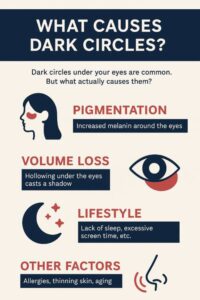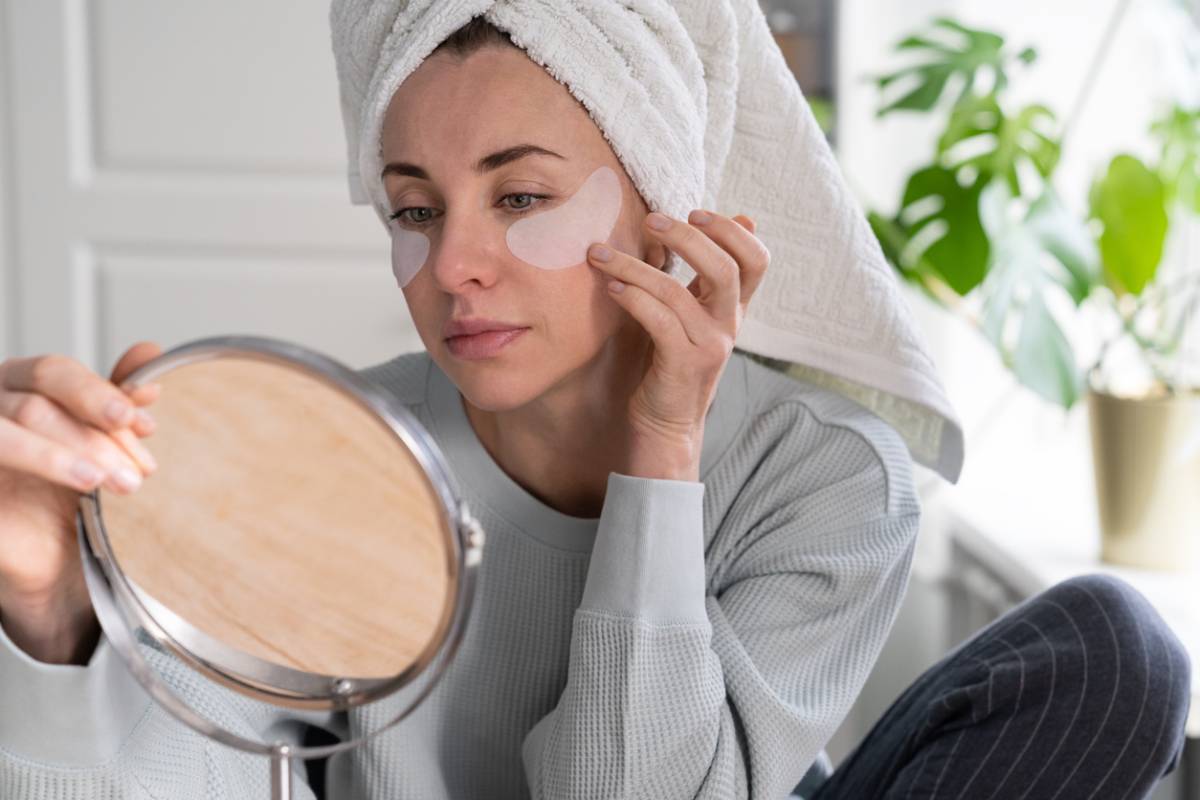You catch your reflection, and there they are again—those persistent dark circles under your eyes. They can make you look more tired than you feel, and over time, they start to feel like a permanent part of your face. You may have tried creams, covered them with makeup, adjusted your sleep, and still wondered why they won’t go away. When it comes to dark circle removal, there’s no singular solution. Understanding what causes them, what can be treated at home, and when it’s time to talk to an oculoplastic surgeon can help you move forward with confidence and reassurance. Check out our answer to “How do you get rid of dark circles under the eyes?” so you can feel better today.
Why Dark Circles Happen

In some cases, dark circles are due to pigmentation. In others, they’re caused by shadowing from hollow areas under the eyes, often referred to as tear troughs. Aging can make these more prominent, but they can also be present from a young age, based on facial structure. These hollows reflect less light and can create the impression of discoloration, even if the skin itself is smooth and unpigmented.
What Topical Products Can and Can’t Do
Many over-the-counter products claim to treat dark circles. Some of them are helpful, particularly when used consistently and for the right reasons. Others fall short because they aren’t designed to address the true cause.
Ingredients like caffeine can reduce puffiness by narrowing blood vessels. Vitamin C supports brightness and collagen production, while retinol increases cell turnover and may smooth fine lines over time. Niacinamide is gentle and can help lighten pigmentation. These ingredients are most effective for mild discoloration or poor skin tone.
However, no cream can reverse facial structure. If your dark circles are mostly due to hollowing or volume loss, even the best topical treatment won’t remove them.
When Lifestyle Helps and When It Doesn’t
Sleep affects your face. But it’s not the full picture. Interrupted sleep for reasons such as snoring or breathing irregularities may reduce oxygen levels and contribute to the appearance of dark circles. Poor sleep quality can slow circulation and drain color from your skin, making the under-eye area look more shadowed.
Hydration supports overall skin health. When skin is dry, it can appear dull or sunken. Drinking enough water and using a good under-eye moisturizer won’t erase dark circles, but they can help reduce the contrast that makes them appear more pronounced.
Cold compresses may provide temporary relief by reducing swelling. Reducing screen time and adjusting the lighting can also improve the appearance of the area throughout the day. But these changes tend to have a surface-level effect. If the darkness is deeply set or related to anatomical features, lifestyle changes alone won’t fix it.
The Allergy Factor
If your dark circles are worse in the morning or during certain seasons, allergies may be contributing to the issue. Inflammation from allergic reactions can cause fluid buildup and dilation of blood vessels under the eyes. Rubbing your eyes also damages the delicate skin in this area, which can worsen discoloration over time. Treating the underlying allergy with antihistamines, nasal sprays, or environmental changes can help reduce the visibility of circles.
When Pigmentation Plays a Role
Hyperpigmentation is a significant contributor to dark circles, particularly in individuals with medium to darker skin tones. It can be genetic or the result of sun exposure and inflammation. This type of discoloration typically responds best to brightening agents such as vitamin C, kojic acid, or azelaic acid; however, treatment must be gentle and consistent. Harsh products or overuse can lead to more irritation and darkening.
This is a situation where professional advice is useful. A dermatologist can determine whether pigmentation or vascular issues are present and guide you toward safe options.
What an Oculoplastic Surgeon Can Do
When skincare and home remedies reach their limit, consulting with an oculoplastic surgeon can open up more lasting options. Oculoplastic surgeons are specialized eye and facial doctors trained in the surgical and non-surgical treatment of the delicate area around the eyes. If your dark circles are caused by hollowing, thin skin, or structural changes, a surgeon may recommend procedures tailored to your anatomy.
One of the most common non-surgical options is the use of dermal fillers under the eyes to restore lost volume. This reduces shadows and can make the under-eye area appear smoother and brighter. In cases of deep pigmentation or texture issues, laser therapy or chemical peels may be recommended. For more severe cases, surgical options such as lower eyelid blepharoplasty may be appropriate.
Knowing When to Seek Support
If you’ve tried lifestyle changes, over-the-counter products, and adjustments without seeing a noticeable improvement, it may be time to consult with a specialist. A dermatologist or oculoplastic surgeon can assess your face with trained eyes and offer options tailored to what will work best for you, as treatment is individualized to your specific needs. In many cases, the right treatment doesn’t require surgery.
Dark Circle Removal Takes More Than Hope
You don’t have to live with persistent discoloration if it bothers you, but you also don’t have to spend years trying products that don’t work for your situation. If dark circles have become more than a cosmetic concern, and you’re ready to take a more targeted approach, a consultation with a qualified oculoplastic surgeon might be the next best step.
Progress is possible. However, it often begins by selecting solutions that are informed by expertise rather than guesswork.
Dark Circle Treatment in Nevada
If you want to ditch the dark circles, schedule a consultation with us today.


